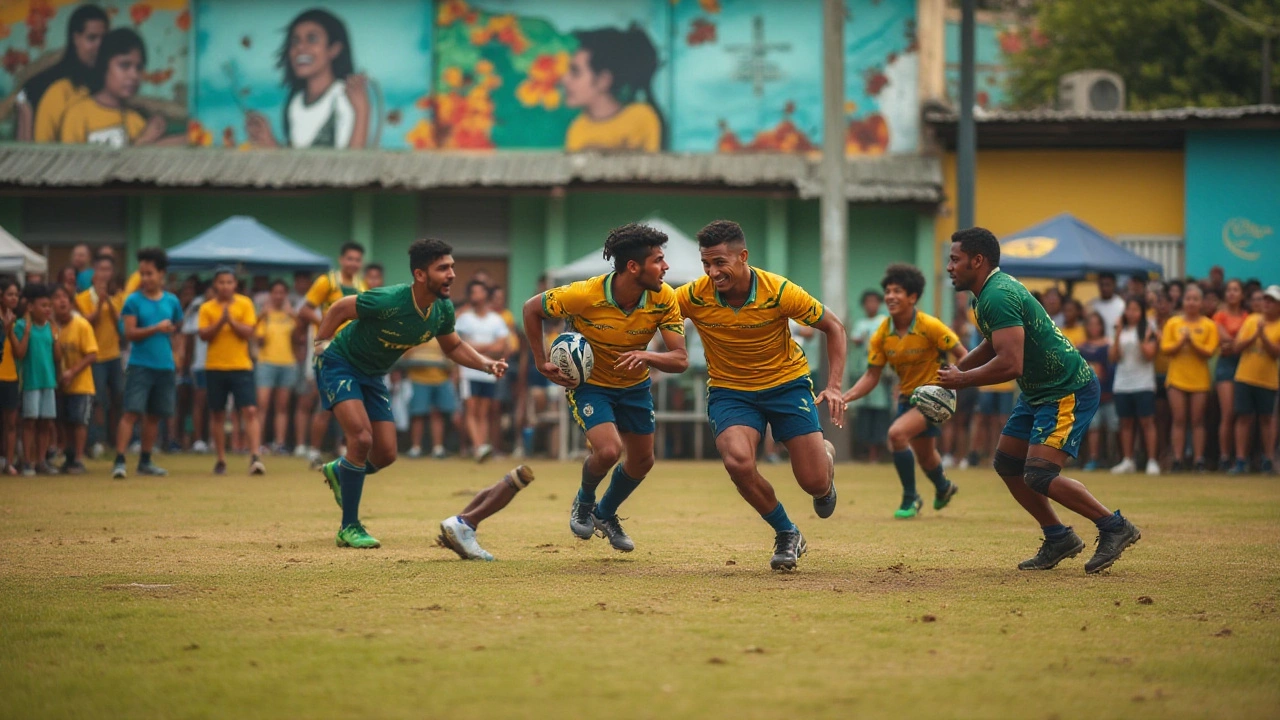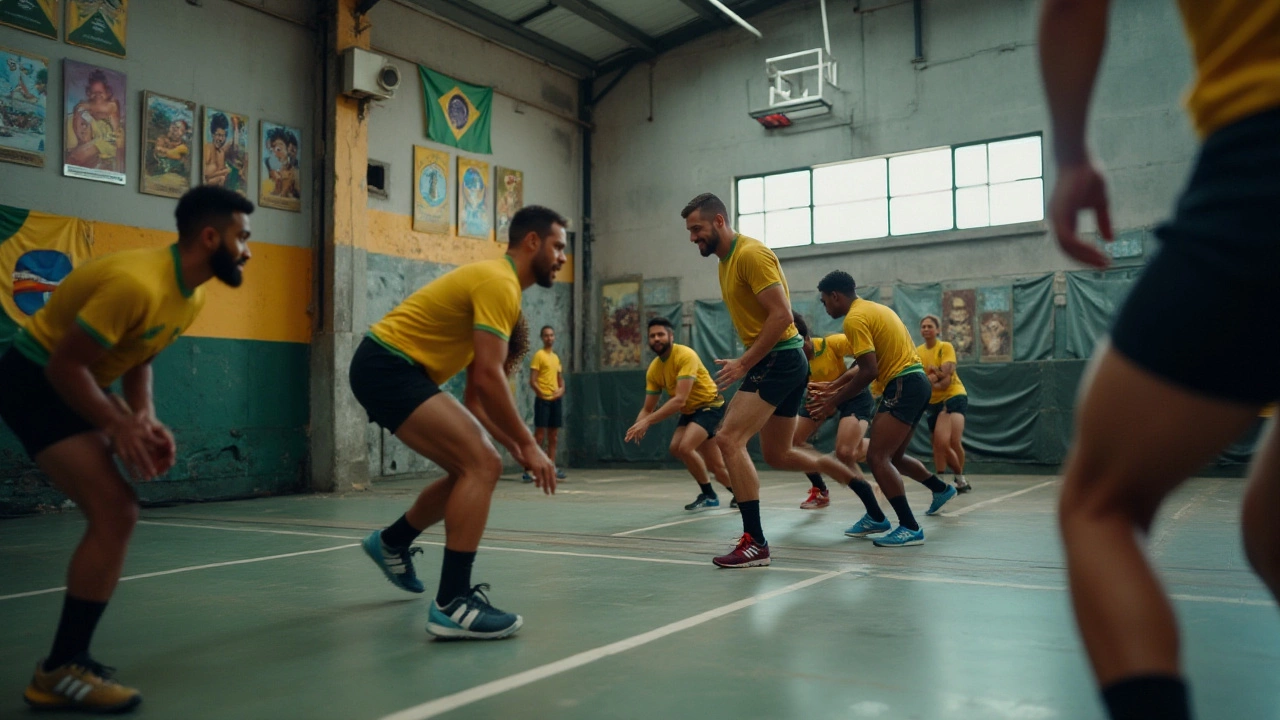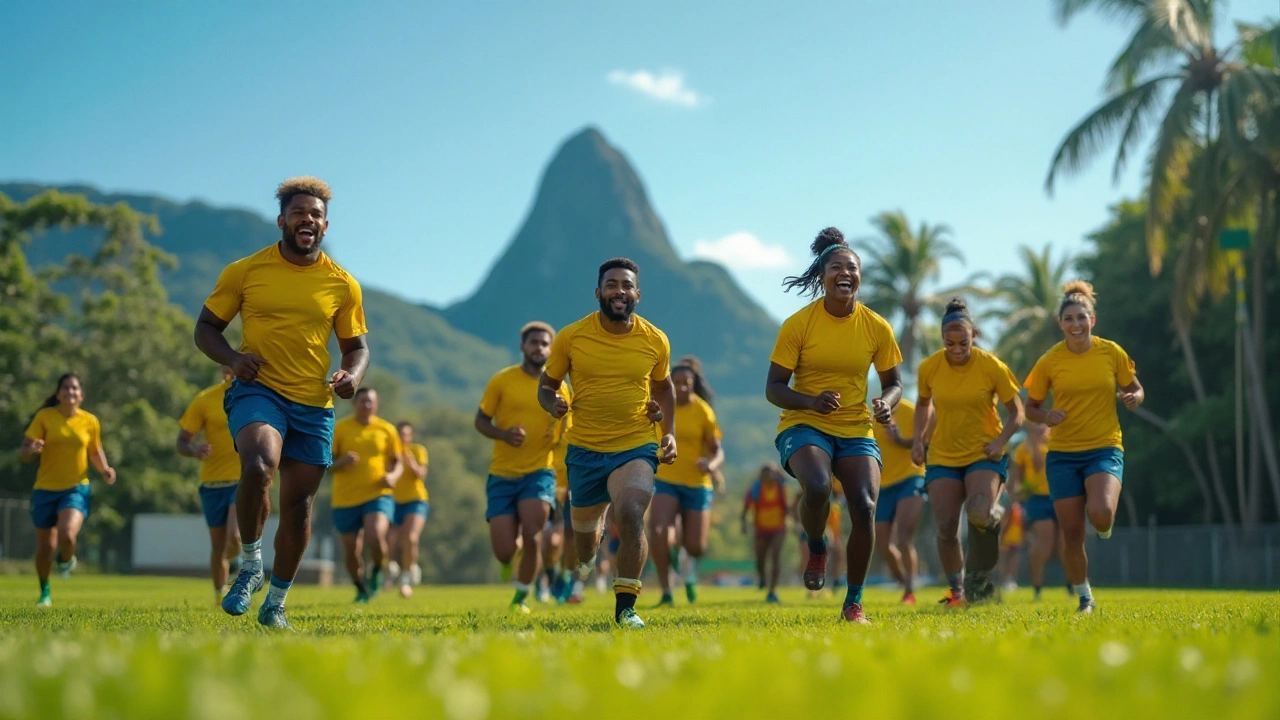When one thinks of Brazil, images of dazzling samba parades, sun-kissed beaches, and the impassioned roar of football stadiums might rush to mind. Yet, nestled amid this carnival of culture, another sport is gathering momentum: rugby. Though a newcomer to the main stage in Brazil's storied sports repertoire, rugby is quietly claiming its place under the tropical sun.
This article unravels the unique blend of factors contributing to Brazil's growing presence in the realm of rugby fixtures. From their distinct training methods to emerging local talents, Brazil is showing that they have more to offer than just a legacy of football excellence. Come along on this journey through Brazil's rugby past, present, and promising future.
- Historical Context of Rugby in Brazil
- Key Strengths of Brazilian Rugby
- Influential Players Making a Difference
- Brazil's Rugby Strategy and Training
- The Future of Rugby in Brazil
Historical Context of Rugby in Brazil
It might surprise some to learn that rugby has been tangled with Brazilian shores for over a century. The sport made its earliest recorded appearance in the late 19th century, riding in with the waves of British and French immigrants who settled in Brazil. Their influence seeded the first rugby clubs that sprouted in the bustling cities of Rio de Janeiro and São Paulo. During these formative years, rugby was largely an expatriate affair, played primarily among foreign communities while drawing limited interest from the local populace, who were transfixed by football’s rise. Historians note that the sport faced challenges in competing with the omnipresent allure of soccer, which swiftly gripped the fervent hearts of the nation.
Yet despite navigating the formidable shadow of football, rugby began sowing the seeds of a cultural affinity. The formation of the Brazilian Rugby Federation in 1972 marked a significant milestone, providing a structured foundation and encouraging native involvement. Rugby's growth was further catalyzed by Brazil’s economic expansion in the latter half of the 20th century, which ushered in increased international exposure. However, the sport’s trajectory wasn’t all linear ascent. Periods of tranquility followed by bursts of activity characterized its development. The 21st century heralded a renewed vigor, as Brazil embraced international rugby events, creating pivotal moments that shifted public perception.
Brazil's ascendancy in rugby fixtures found momentum with the inclusion of rugby sevens in the Olympics, a pivotal point that aligned perfectly with Rio de Janeiro's hosting of the 2016 Summer Olympics. Brazil's women's team became one of the few non-traditional rugby nations to compete, leaving a profound impact on national consciousness. It's worth noting how Brazil’s diverse culture injects unique flair into their gameplay, resonating the samba rhythm many associate with Brazilian sports. A local commentator once remarked, "Rugby here is not just about the game; it’s about the stunning amalgamation of energy, music, and community." It ushered a new era, passion for rugby seeped into schools and universities, feeding a grassroots engine poised to fuel future talent.
As of recent years, the sport's governing bodies and local clubs have double-downed on forging pathways for youth engagement. Training camps and strategic partnerships with more established rugby nations have bred a new generation of talent. Brazilian rugby talents are now making their way into international circuits, showcasing skills honed on distinctive home turfs. Icons of today's Brazilian rugby envision a renaissance, seeking to make significant strides on both men’s and women’s platforms in world competitions. Efforts are visible in the vigorous national league that acts as a cornerstone for talent cultivation. In this evolving tapestry of rugby in Brazil, the blend of historical influences and modern initiatives paints a vibrant canvas, reflecting both resilience and ambition.
Key Strengths of Brazilian Rugby
Brazil may surprise sports enthusiasts with its rise in rugby, an arena traditionally dominated by European and southern hemisphere nations. The country is fueled by an energetic, spirited culture that translates seamlessly to the rugby field. This lively enthusiasm becomes evident when observing Brazilian teams play – there is an infectious vivacity, an insatiable hunger for victory that captivates fans and intimidates opponents. Brazil's unique aggression and passion in gameplay are key strengths propelling them onto the international stage.
Brazilian rugby talents benefit from a foundation of athletic skills, honed from years in other sports, particularly football. Football has cultivated natural agility, endurance, and footwork, assets transferred effortlessly to rugby. Brazilian players often exhibit exceptional agility and quick reflexes, necessary for the fast-paced nature of rugby. The influence of Brazil's football culture is ever-present, ensuring players have robust cardiovascular fitness, enabling prolonged and intense performances.
The geographical aspect of Brazil adds another layer to their rugby prowess. With a diverse climate, ranging from tropical in the north to temperate zones in the south, Brazilian teams gain unique preparation. Training in varied weather conditions builds resilience, translating to a higher tolerance for playing internationally, in varied environments. Brazil’s extensive coastline encourages an active, outdoor lifestyle, augmenting players' physical readiness for rugby’s demands.
"Brazilian rugby is more than just a game; it’s a celebration of life and energy," stated by Maria Luiza Cardoso, a former national coach.
A strategic advantage for Brazil is their investment in rugby strategy and training. The nation has expanded its sports infrastructure, offering advanced facilities and expert coaching to nurture local talent. Development programs introduce young athletes to rugby, fostering skill from an early age. Learning the nuances of professional rugby while embracing Brazilian creativity creates dynamic, unpredictable playstyles that are difficult for opponents to counter.
A sense of community thrives within Brazilian rugby, emphasizing teamwork and social bonds. These strong connections among players foster idyllic cooperation on and off the field. Brazilians are known for their social nature, and this camaraderie strengthens team chemistry. Coupled with a robust grassroots movement, Brazilian rugby develops a deep well of motivated players and enthusiastic supporters, driving the sport's evolution.

Influential Players Making a Difference
Brazil's journey in the rugby world has been significantly shaped by a cadre of exceptional players who have carved their names into the annals of the sport. Among these, Moisés Duque stands out as a beacon of talent and determination. Born in São José dos Campos, his journey to the rugby national team is nothing short of inspiring. As a fly-half, Moisés brought not only agility and precision to his play but also an indomitable spirit that often rallied the team to unexpected victories. His ability to maneuver through opponents with ease, coupled with his sharp decision-making on the field, makes him a model for aspiring players.
Moisés isn't alone in making waves. Lucas Tranquez, often hailed the 'Rock of Brazil' in defense, has a substantial presence on the field. His intimidating tackles and unyielding strength make him a formidable opponent. No highlights reel would be complete without his audacious moves that often leave audiences in awe. Through his leadership roles in the team, Tranquez has helped shape a disciplined yet passionate squad. His commitment is apparent during both match days and practice sessions, where his energy and focus lift the entire team's performance.
It's not just the men’s team that showcases exemplary talent. Júlia Sardá, a rising star in the women’s rugby scene, has been making remarkable strides. As a scrum-half, her agility and speed add a dynamic edge to Brazil's playstyle. She carries the ball with grace and skill, making every play look effortless, while her quick passes and strategic kicks ensure a smoother navigation across tough matches. Júlia often credits her success to the supportive ecosystem of coaches and fellow players around her. "We are a family, on and off the field," she says, highlighting the team's camaraderie and collective vision.
"In rugby, alone you go fast, but together you go far," Júlia reflects, embodying the spirit of Brazilian rugby.
In the grand narrative of rugby, players like Moisés, Lucas, and Júlia are redefining Brazil's image globally, carrying the team's ambitions across international fixtures. Their dedication not only embodies personal achievements but also shines a spotlight on Brazil as a rising competitor in the global rugby landscape. As the sport finds more footing in this vibrant nation, the contributions of these key players will undoubtedly serve as inspiration for future generations. Both fans and aspiring athletes have much to look forward to as these players continue to contribute at the highest level, setting the stage for Brazil rugby strengths on the world map.
Brazil's Rugby Strategy and Training
In Brazil, rugby has tailored its strategy and training to maximize the natural athletic ability and spirited enthusiasm that the nation is renowned for. Recognizing the distinct makeup of its players, Brazilian rugby harnesses speed, agility, and creative playmaking as crucial components. This strategic outlook not only aligns with the traditional Brazilian flair seen in sports but also sets a unique blueprint in the list of booming rugby fixtures.
The Brazilian rugby scene has developed a robust grassroots program which introduces the sport to youngsters across a variety of regions. These initiatives ensure that a love for the game is nurtured from a young age, allowing skillsets to grow organically and resonate with local culture. Training centers scattered across the country are now offering tailored training modules that focus on both physical conditioning and tactical acumen aimed at executing precise plays under pressure.
A crucial component of Brazil's training methodology involves smart utilization of its natural environment. Mountainous terrains, lush forest trails, and sandy beaches offer diverse landscapes for rigorous training sessions. This environment encourages a holistic improvement of player stamina, agility, and strength which proves advantageous on the rugby field. This naturalistic approach ensures players are conditioned for the endurance needed in grueling fixtures.
The coaching philosophy in Brazil places a substantial emphasis on collaborative team dynamics and fostering resilience—traits essential in demanding rugby matches. Coaches often employ innovative drills that simulate match conditions to develop intuitive decision-making skills. To strengthen the psychological aspect, Brazilian rugby training also includes mental conditioning programs. These programs equip players with strategies to maintain focus and composure during high-pressure moments indicative of significant Brazil rugby strengths.
"Harnessing the geographical richness and instilling a playful spirit make Brazilian rugby uniquely formidable," remarked Lucas Rocha, an influential figure in South American rugby.
As a strategy, Brazilian rugby also benefits from international collaborations. The Brazilian Rugby Confederation frequently facilitates exchanges with countries like New Zealand and England to infuse their local training with advanced techniques and insights. This not only raises the playing standards but also embeds a competitive edge needed for international games. Regular participation in meaningful fixtures sharpens skills, adds experience, and instills a can-do attitude.
With these strategic attributes and bespoke training regimens, Brazil is carving out its niche in the rugby world. As they continue to refine their approach by integrating feedback and honing player skills, the future of Brazilian rugby talents looks thrilling and promising. By melding tradition with modern techniques, the Brazilian rugby strategy stands as a testament to the country's commitment to leaving a mark on the global rugby arena.

The Future of Rugby in Brazil
The future of rugby in Brazil seems to be unfolding with a vibrancy that echoes the country's celebrated energy. While Brazil is famed for its football fandom, rugby has begun to carve a supportive niche among enthusiasts looking for the thrill of scrums and tries. As interest in the sport grows, so too does the infrastructure supporting it, from local clubs sprouting in urban parks to dedicated sports academies helping youngsters hone their skills. The Brazilian Rugby Confederation has been working diligently to promote rugby in schools, not only as a sport but as a vehicle for fostering discipline and teamwork among the youth.
A pivotal factor in this budding potential is Brazil's strategic focus on grassroots development. Programs aimed at underprivileged areas are offering children not just a chance to play but opportunities for personal growth. These initiatives focus on inclusivity, bridging the gap between different regions and social backgrounds, and nurturing homegrown talent that might one day represent Brazil on the international stage. The popularity of the sport can only add momentum to such grassroots efforts, with local tournaments providing platforms for players to showcase their prowess.
One cannot discuss the future of rugby in Brazil without mentioning the significant role of international exposure. In recent years, Brazil has aspired to feature more prominently in international rugby fixtures, learning and adapting strategies from seasoned rugby nations. Participation in tournaments like the Americas Rugby Championship has provided invaluable experience, honing the players' abilities to face varying styles and techniques. The Brazilian national team, affectionately known as the "Tupis," has been drawing inspiration from these matchups, blending traditional styles with innovations unique to their athletic makeup.
While there's a long road ahead, there are signs of optimistic headway. According to a report from Rugby World Magazine, the number of registered rugby players in Brazil has nearly doubled in the past five years, indicating a rising wave of interest (Rugby World, 2023). With increased support from fans and the federations alike, rugby could very well emerge as a sport that brings communities together, much like its counterpart in football. As with any burgeoning sport, challenges persist, such as funding and access to top-tier coaching. However, the passion for rugby and the dedication of those involved suggest a promising trajectory.
"The rugby community in Brazil is one of fierce passion and relentless drive, much like the game itself. As these elements come together, Brazil is poised to shine on the rugby field as a testament to the country's dynamic sporting spirit." - Rugby World Magazine
Moreover, collaborations with established rugby nations have opened a dialogue about strategic partnerships, equipping Brazilian players with insights and inspiration. With the country fostering an inclusive sporting culture, Brazil could soon see rugby not just as a competitive sport but as an ambassador of social values and an avenue for young athletes to make their mark. Although football might reign supreme, the direction in which rugby is heading shows a future where Brazilian rugby could stand shoulder to shoulder with the giants of the sport.
